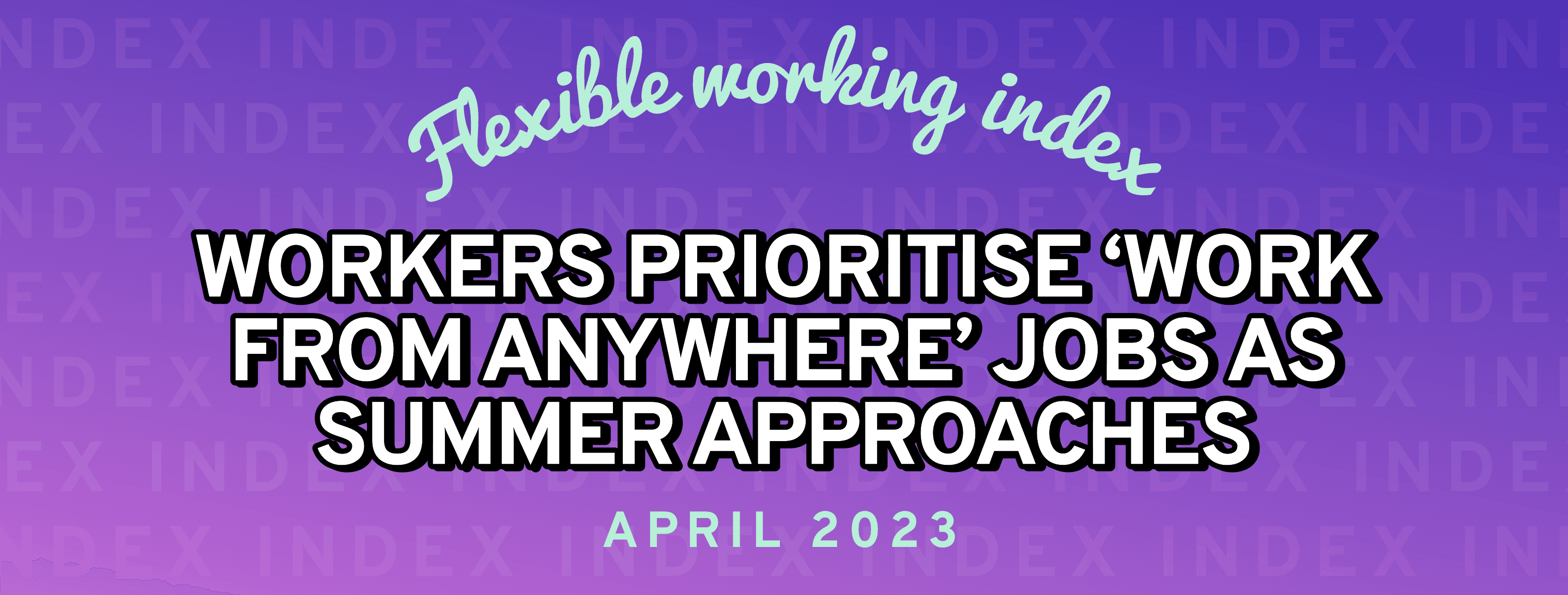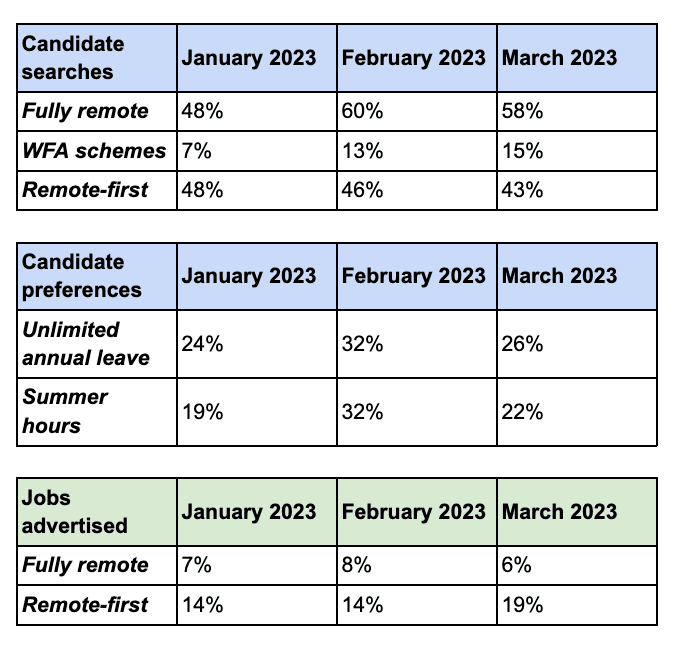Flexible Working Index April 2023
17th Apr 2023

Workers prefer 'Work From Anywhere' jobs as summer nears
The latest Quarterly Flexible Working Index, which analysed the working preferences expressed by job seekers over the last three months, has recorded renewed interest in working for companies that offer remote roles as summer approaches.
Workers are seeking fully remote roles in anticipation of summer
Ahead of the summer, workers are turning their backs on offices and looking to explore companies that allow them to work from different locations. Between January and March of this year, searches for “fully remote” roles (where there is no obligation to come into an office) rose by 21% - up from 48% of all searches in January to 58% of all searches in March.
This points to a reversal of sentiment seen last autumn when fully remote companies fell out of favour with jobseekers as the summer months ended. This continued into the winter, with searches for companies offering fully remote roles dropping to an all-time low of 26% in December 2022.
The renewed popularity of fully remote roles this spring indicates that preferred working locations may evolve in line with the seasons.
Searches for companies that offer “Work From Anywhere” (WFA) schemes (whereby employees can spend a period of time working outside their usual jurisdiction) as part of their flexible benefits have risen month-on-month since the start of 2023. Searches for WFA schemes more than doubled in the last quarter - rising from 7% of searches overall in January to 15% of searches overall in March.
Molly Johnson-Jones, CEO and co-founder of Flexa, comments:
“The majority of workers are now looking for remote-friendly companies. More specifically, we’re seeing a rise in popularity of companies offering Work from Anywhere schemes - companies like Depop, Blood Cancer UK, Multiverse, and Huel - who are leading on the evolution of work with a WFA offer.”
Employers are offering more “remote-first” than fully remote roles
Instead of fully remote roles, employers tend to offer “remote-first” roles, where employees work most of the time remotely but also have the option to use office space on flexible or set days.
The number of remote-first roles advertised by companies rose from 14% in January to 19% in March - meaning the number of remote-first roles advertised was three times as high as the number of fully remote roles advertised over the same time period.
These remote-first roles, however, aren’t as in demand amongst jobseekers - who are less likely to be familiar with the term, compared to fully remote roles, for example. The number of job hunters searching for companies offering ‘remote-first’ roles dropped by 10% across the quarter - down from 48% in January, to 43% in March.
Molly Johnson-Jones, CEO and co-founder of Flexa, comments:
“Remote-first roles might not sound as flexible as fully remote roles. But companies that offer the former offer the most flexibility of all: the option to work from home or elsewhere the majority of the time, as well as the option to use company office spaces. It's encouraging to see that so many companies are prioritising this – flexible working is ultimately all about the power of choice."
Jobseekers prioritise summer hours and summer holidays
In the build-up to spring, jobseekers were keen to explore different working hours and annual leave policies to maximise their weekends and holidays.
The number of job seekers expressing a preference for working for companies offering “unlimited annual leave” increased by 33% between January and February - up from 24% to 32% - before levelling out somewhat in March, when 26% of searches were for companies offering “unlimited annual leave”.
Similarly, preferences for “summer hours” (where workers are able to finish earlier on Fridays during summer months) rose by 68% between January and February - up from 19% to 32% - before dipping slightly in March, when 22% of users overall preferred “summer hours”.
Molly Johnson-Jones, CEO and co-founder of Flexa, comments:
“Over the last quarter, we’ve seen record numbers of people searching for flexible roles and droves of companies adapting their working environments to get ahead of the trend. The huge amount of data generated by these sample sizes has also shown that seasonal working trends look set to become a regular pattern as people continue to demand a more flexible work-life balance.
“Fully remote roles have seen a resurgence in popularity amongst staff in the lead up to the summer months. Work From Anywhere schemes, unlimited annual leave and summer hours have also emerged as popular flexible benefits this spring, as workers start thinking about maximising their weekends and annual leave during the warmer months.
“Offices on the other hand have lost some of their shine this season, although employers are clearly still displaying a preference for having staff together in person some of the time.”
Flexible working data
Take a look below to see what the flexible working data shows this quarter.
